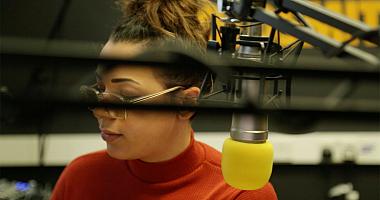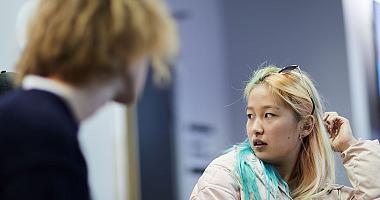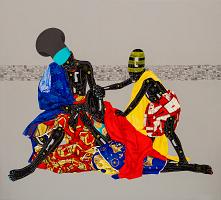PGCert
Political Communications
Content navigation menu
Why study PGCert Political Communications at Goldsmiths
The Postgraduate Certificate in Political Communications offers teaching that is critical, innovative and diverse. It combines theory with practical, applied elements, and draws on a range of research and contemporary examples.
- The programme covers political communication from national and international level, down to the local and personal – from governments and parties, to NGOs and local acitivist groups. You'll have the opportunity to engage with cultural, alternative and digital, interactive communication as well as traditional mass media.
- The Department of Media, Communications and Cultural Studies has been ranked second in the UK for 'world-leading or internationally excellent' research (Research Excellence Framework, 2021) and 16th in the world (third in the UK) in the 2024 QS World Rankings for communication and media studies.
Develop your critical thinking
- This dynamic programme offers critical engagement, asking difficult questions about politics, economic policy, society and the media.
- You will not only gain an understanding of the forms and impacts of political communications, it will help you contextualise that knowledge in relation to the structures, institutions and actors that are at the heart of politics and media.
Practical application
- Alongside skills-based components, you'll also be offered several applied options.
- Practice-based options such as Campaign Skills are taught by professionals in the field. There are also several speaker series running each year with guests from the worlds of politics, journalism, business and campaigning coming to talk.
Contact the department
If you have specific questions about the degree, contact Jacob Mukherjee.
Length
Three academic terms (September-June) equivalent to part-time study
Entry requirements
Applicants will normally have, or expect to gain a first degree of at least upper second class standard (or equivalent).
Department
What you'll study
The Postgraduate Certificate in Political Communications aims to provide you with a systematic understanding of the interactions between political actors, communication industries and the public in contemporary societies.
Specifically, the programme will equip you with in-depth knowledge of the importance of communication in the political process and of how, in a democratic polity, political institutions and others seek to communicate with the public and vice-versa.
For the main part, this will lead to a concentration on the role of the mass media but other forms of political communication - including the techniques of marketing, polling, face-face interaction and internet campaigning - will also be studied. However, the knowledge and skills acquired in such a study will have far broader applications.
Students completing this programme will gain a range of tools that will enable them to analyse social and communicative interactions in the public sphere and to make judgements about future modules of action based on this understanding.
| Module title | Credits |
|---|---|
| The Structure of Contemporary Political Communications | 30 credits |
| Critical Perspectives on Political Communications | 30 credits |
Teaching and learning
The acquisition of knowledge and understanding and cognitive learning outcomes is through weekly lectures, seminars and workshops so that core knowledge gained through reading and lectures may be reinforced through seminar participation, discussion and debate. Outside speakers with specialist knowledge of a particular topic will also give occasional lectures.
How you'll be assessed
You will receive feedback from tutors throughout the programme in seminars and in response to your examined work. Tutorial support is available to advise you on their progress in skill acquisition in both theoretical and more practical work.
Formal assessment is all by writing, though with a mix of different forms. The assessment is demanding, requiring you to work on different assignments simultaneously. The number of assignments ensures you have a grasp of breadth as well as depth of the field of media and communications. Assessment of this sort tests not only intellectual knowledge, but also your capacity to work under pressure, and to think independently and resourcefully.
Entry requirements
Applicants will normally have or expect to gain a first degree of at least upper second class standard (or equivalent).
International qualifications
We accept a wide range of international qualifications. Find out more about the qualifications we accept from around the world.
If English isn’t your first language, you will need an IELTS score (or equivalent English language qualification) of 6.5 with a 6.5 in writing and no element lower than 6.0 to study this programme. If you need assistance with your English language, we offer a range of courses that can help prepare you for postgraduate-level study.
How to apply
Apply directly to Goldsmiths using our online application system.
Find out more about applying for a postgraduate qualification at Goldsmiths.
Fees and funding
Annual tuition fees
These are the PG fees for students starting their programme in the 2025/2026 academic year.
- Home - Part-time: £3750
If your fees are not listed here, please check our postgraduate fees guidance or contact the Fees Office, who can also advise you about how to pay your fees.
It’s not currently possible for international students to study part-time under a student visa. If you think you might be eligible to study part-time while being on another visa type, please contact our Admissions Team for more information.
If you are looking to pay your fees please see our guide to making a payment.
Funding opportunities
Explore the Goldsmiths scholarships finder to find out what funding you may be eligible for.
Paying your fees
Find out about paying your tuition fees.
If you are a UK student you may be eligible for a postgraduate loan.
Find out more about postgraduate fees and explore funding opportunities. If you're applying for funding, you may be subject to an application deadline.
Additional costs
In addition to your tuition fees, you'll be responsible for any additional costs associated with your course, such as buying stationery and paying for photocopying. You can find out more about what you need to budget for on our study costs page.
There may also be specific additional costs associated with your programme. This can include things like paying for field trips or specialist materials for your assignments. Please check the programme specification for more information.
Careers
The Department of Media, Communications and Cultural Studies has a strong record of employment prospects for its alumni. Graduates have won numerous awards for their practice work and have gone on to a wide variety of jobs: some in the media industries, some in professional fields only distantly related to the media, and - consistently - a small group from each annual intake go on to do further academic research.
Find out more about employability at Goldsmiths.
Skills and knowledge
The programme will provide you with:
- Knowledge of the history and development of political communications with a international emphasis;
- An understanding of the theoretical debates that have informed the study of political communications;
- An awareness of both dominant and alternative models of interaction between political actors, communicators and the public;
- An overview and insight into current debates - both academic and professional - within the field
In addition, the programme will provide students with practical skills and insights that will enable them to:
- Undertake a range of tasks in relation to the planning and commissioning of political communications work from within various public and private bodies;
- Commission political communications work from within public and private sector bodies or on behalf of clients;
- Analyse political communications activity from and academic and journalistic perspectives.




.jpg)
